Whether you live and breathe fitness or simply tend to overindulge on holidays, staying in tip-top shape while travelling can be a challenge.
If it's weight gain on your wintry sojourn or sunburn on your summer escape, anything that might put your health status on hiatus can be a major post-holiday hassle.
Possibly the most challenging part of travelling (particularly when you're in it for the long haul), is the process of getting 'there'. No matter if you're going by plane, boat or road, you can bet that there'll be some degree of discomfort along the way.
When you invest time, money and energy getting to your long-awaited holiday, your path should ideally be as smooth and hassle-free as possible. Our top tips below show you how to prevent and minimise any potential troubles on your trip.
Travel can be trying but with the right know-how, you can return from your holiday in tip-top shape! Our helpful guide shows you how to stay healthy in all corners of the globe. As well, we'll tell you how to keep in good nick whether you're flying, driving or cruising to your destination.
So go on. Take on the world and return a better you!
Air travel health tips
There's no doubt about it, flying can be trying. Despite the many fantastic facets of air travel, most passengers have experienced some form of hiccup along the way. The following flying health tips can help you last the distance malady free.
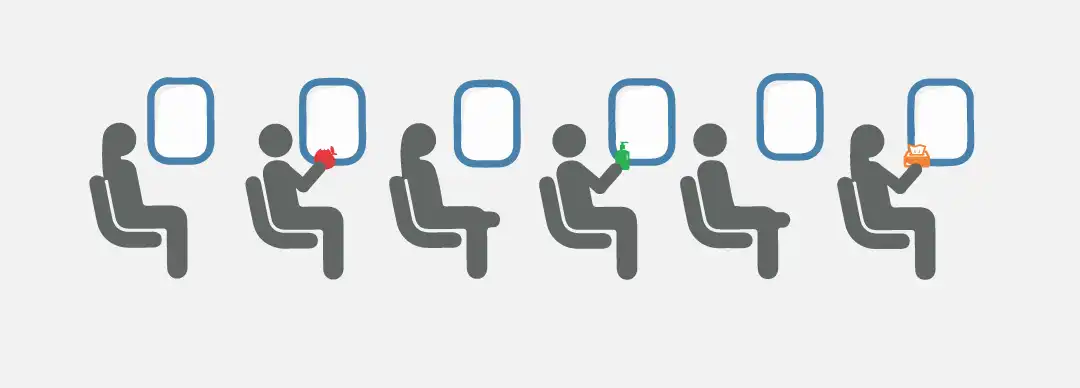
Before your flight
Often the frustrations of flying come from the general discomfort we associate with it; long queues, crowded cabins and noisy airports can give anyone a case of the grumps. However, staying calm and preparing for the journey ahead can help keep you sane and feeling strong.
Try to upgrade: There are some that will swear by their frequent flier points - and that the only way to fly is with an upgraded seat ticket. The extra leg room, reclining chairs, gourmet meals and decent entertainment can ease the pain of flying, and leave you feeling refreshed rather than exhausted. At the very least, ask politely for an upgrade at the flight counter.
Connection attention: Clearing customs, picking up luggage, locating new terminals and repeating the whole process can be arduous to say the least. When booking, pay attention to connections, ensuring that you have adequate time to make your next flight.
Vitamin load: Airplane cabins are rife with germs and potential hazardous conditions. Load up on vitamin C and B-complex vitamins to bolster your immunity a few days before flying.
Snack pack: Packing some fruit, a sandwich, a few protein bars or trail mix can help you resist those high sugar, preservative filled inflight snacks.
Foodie finder: Questionable airline food is no new thing, but picky eaters or those with dietary restrictions may want to research the meal offerings across various airlines before booking.
Rest up: Contrary to popular belief, the best way to get on a flight is not in a state of complete exhaustion. Should you find sleep an impossibility (which is highly likely on a flight) your fatigue will feel truly punishing. Get adequate rest before your flight and once on board, nap as often as you need.
Comfy clothes: Tight jeans, stiff suits and stiletto heels have their place, and that's not on an airline cabin. Stick to comfy, loose clothes with room for movement and shoes that can be easily slipped on and off.
Inflight health-kit:
Having a healthy supply stash can keep you feeling fresh while you're soaring thousands of feet above the ground. Consider the following essentials for your next flight: hand sanitizer, neck pillow, water, noise cancelling headphones, moisturiser, flight socks and eye drops.
During your flight
So you're prepared and ready for all manner of mid-air annoyances. However, once you're up and soaring through the sky there are still plenty of ways to enhance and even enjoy your travel experience with oodles of health benefits to spare.
Careful carry-on: We've all seen the poor passenger struggling with more carry-on luggage they can lift. Don't take more than you can handle on board and when stowing your carry-on, stand up straight and away from the overhead compartment. Rather than risk straining your back lifting them, keep heavier bags under the seat in front of you.
Hello hydration : If you tend to get particularly parched on a plane you're not alone; aeroplane cabins are extremely low in moisture and can cause you to feel seriously dehydrated. Drink lots of water to counteract the dry conditions and avoid caffeine and booze- both can dehydrate you further. As well, stay moisturised witheye drops and plenty of moisturizer on hand.
Keep moving: Sitting motionless for hours on end can lead to a build-up in fluid around your legs, increasing your risk of deep vein thrombosis (DVT). This potentially dangerous condition.
Dine wise: Skip the bread roll with butter and avoid creamy desserts- too much starch and fat can slow down your digestion. The same goes for cruciferous vegetables like cauliflower, broccoli and cabbage- these can make you seriously gassy in the air. Alcohol as well, can be seriously dehydrating on a flight so drink two glasses of water for each serve of alcohol.
Post Flight
If you've planned your flight well you should be feeling well rested and hydrated on touch down. However, the dry cabin air and long hours in a pressurised environment can wreak havoc on even the best immune systems. The following tips will get you healthy and holiday ready not long after landing.
Seek the sun: As tempting as it seems, resist the urge to crawl into bed and try to bask in the sun (or simply spend time outdoors) for as long as you can. This will help your body clock adjust to your new surroundings.
Eggs-ellent breaky: Opt for a protein rich meal the morning after your flight. A serve of eggs benny will give you a much-needed brain boost and help you feel alert and energised.
Get local: As soon as you get off the plane, set your watch to the destination time. If possible, try to alter your sleep patterns before you to more closely match the times of your destination.
Ease your way in: Give yourself a day or two before you hit the ground running. Opt for a private hostel room, take a leisurely stroll and leave the action packed, sightseeing trips for a few days after you've properly 'landed.'
Road trip health tips
When you want to get away from it all, you may feel completely focused on your destination. However, a road trip can be the perfect way to get off the grid. Getting out on the open highway can be completely liberating and offer you total spontaneity. Nevertheless, hours at time behind the wheel (or in the passenger seat) can be detrimental to your health and stress levels. Read on to discover ways to ensure that your road trip doesn't drive you to distraction!
If it's time for another family road trip - you'll know by know that driving for hours on end with nippers in tow can drive you to distraction. The following items can help to minimise any motorway meltdowns:
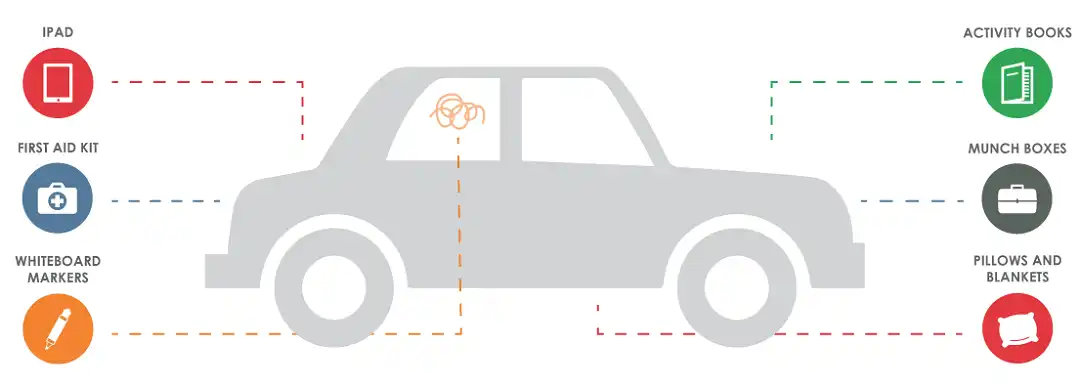
Roadtrip-pre-planning
Pre-road trip prep: We've all been there, you've begun your trip and are already half an hour away from home only to realise you've left your wallet/phone/glasses/laptop and you must turn back. Argh! Ease the 'just left home' panic by ensuring you've prepped sufficiently beforehand. As well, make sure your route is planned and your accommodation is booked.
Food on the fly: Driving for hours on end can be surprising exhausting and deplete your energy stores faster than you'd think. To avoid succumbing to the fast food drive through or petrol station sugar fix, prepare a healthy snack food stash. Sliced apples, carrot sticks, muesli bars and trail mix will help keep you going until your next scheduled stop.
Research healthy restaurants: Take the time to research healthy pit stops on your journey before you've left home. If possible, make bookings to avoid disappointment!
Take regular breaks: Sitting in the same position for hours on end can be incredibly debilitating on your body and it's incredibly important to keep moving and have a good stretch every so often. Three hours should be the maximum amount of time between breaks in which time you should move around and stock up on water and food supplies.
Swap drivers: Taking a break from the wheel is just as important as switching positions. If possible, take turns swapping drivers to ensure you don't fall victim to driver's fatigue.
Sun smart: It seems unlikely but you can get seriously burnt while driving! Sun rays beaming through your car windows can be more damaging than you'd expect so slather on the SPF and ensure you've got a pair of sunnies to shield your peepers.
Gear up: Bring athletic gear with you on your trip. Even if you're just on the road for a few hours, you never know when the urge to get out and hike around a scenic spot will hit. A set of weights, an exercise mat and a pair of running shoes may come in handy when you've been driving for hours on end.
Safety on the road
Simply put; car accidents take a heavy toll. Even a minor ping can cost you a bundle and be an utter inconvenience. Of course, on the other end of the scale, a major accident can be ruinous and completely life-altering. Take the following precautions to minimize your risk on the road.
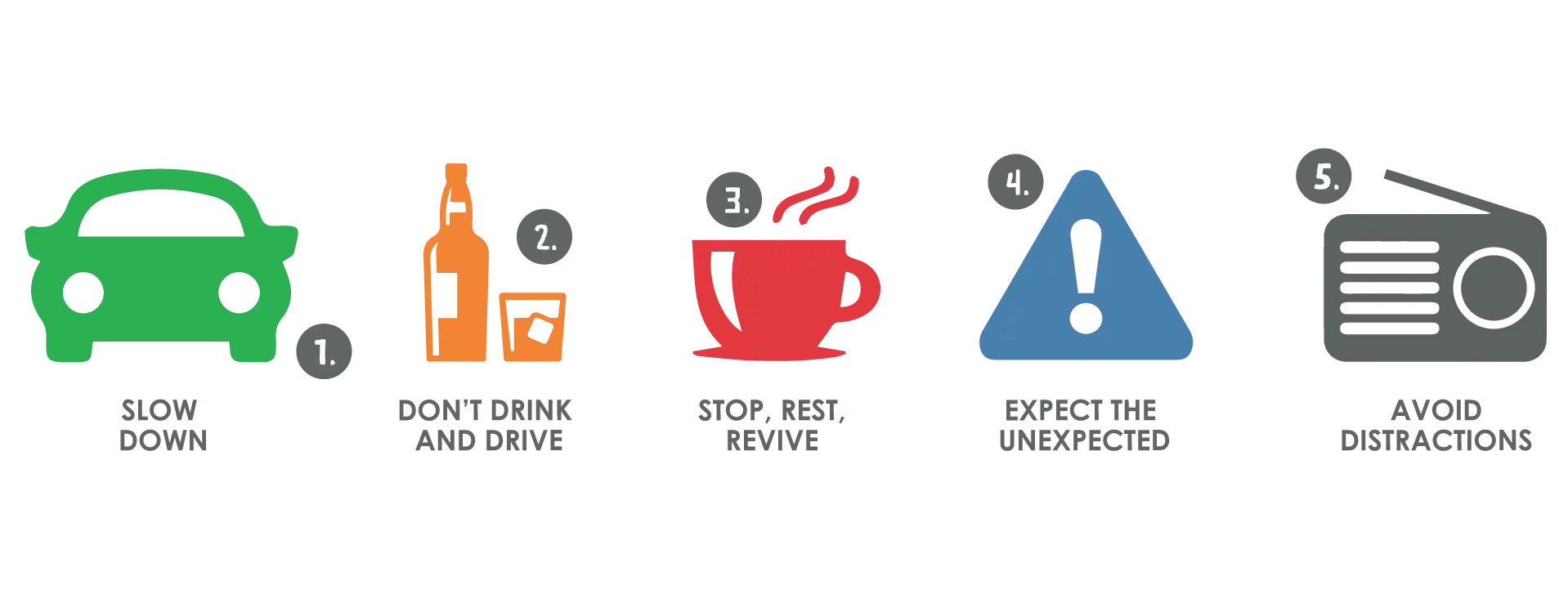
1. Slow down: It's a no-brainer but the faster your drive, the longer it takes to slow down. A small decrease in your speed can greatly diminish your risk of crashing. Maintain a two-second gap from the car ahead and double this to four seconds when it's raining, foggy or otherwise hazardous.
2. Don't drink and drive: However tempting it may be to have a tipple or two, it's advisable to stay clear of any alcohol when getting behind the wheel. Not only does liquor affect your driving skill, readiness and behaviour, once it's been consumed the effects cannot be reversed. In 2015 driver alcohol/drugs were a contributing factor in 88 fatal traffic crashes, 324 serious injury crashes and 850 minor injury crashes.
3. Stop, rest, revive: Fatigue is one of the biggest dangers on our roads and one that particularly affects long-distance commuters. Driver fatigue has been likened to drink driving and fatigue-related crashes are twice as likely to be fatal. Remember; sleep is the only cure for tiredness.
4. Expect the unexpected: Everyone makes mistakes on the road; we're only human! However, staying alert and aware can help you to anticipate your drivers' mistakes.
5. Avoid distractions: Internal and external distractions can pose danger to your driving. Keep activities to a minimum and use your mobile only in emergencies.
Additional tips
Check your car: As important as it is to keep your driving in check, your car could be a potential liability too. Before you set off check your tyres (including your spare), make sure you've got a full tank of fuel, windscreen wash, oil, water, functioning break lights and that child seats are properly fitted.
Keep the kids entertained: Kids and other vehicle occupants can be highly distracting! Make sure you have plenty of games-on-the-go and treats to keep the small members of the family entertained. Ensure any furry members of your family are properly restrained and cared for and secure any loose objects. Check out more family-friendly road trip hacks here.
Roadside assist: There's nothing worse that breaking down on your road trip. If you haven't already invested in roadside assistance, now may be the time to reward yourself to prevent an unexpected pitstop.
Courtesy first: As trying as it may be; road rage can be dangerous and stress provoking. Do your bit to maintain courtesy and respect the rights to safety for everyone on our roads. However, if you do encounter an aggressive driver avoid conflict and move out of the way when safe to do so. Remember to abide by the road rules on long drives and avoid hogging the middle lane.
Cruise health tips
Whether you live and breathe fitness or simply tend to overindulge on holidays, staying in tip-top shape while travelling can be a challenge.
Beat the buffet binge: The average cruise passenger puts on a pound a day and with lavish buffets and unlimited snacks, it's easy to 'sea' why! Pace yourself and be sure not to overload you plate at each meal. Get on board with nutritional, preservative-free snacks to keep you satiated in between meals. Use on-board gyms, walk around the deck and explore the local shores.
Hygiene helper: 1 in 12 cruise passengers risk contracting gastroenteritis due to poor hygiene, close quarters and food contamination. To avoid picking up nasties always wash your hands, use sanitiser and limit person-to-person contact. And before you wave adieu, vaccinate for the flu!
Bring repellent: Mosquitoes are just as likely to hop on board, bringing with them exotic illnesses. Stock up on repellent and layer up.
Stay sun safe: You're by the pool, cocktail in hand, ... burning to a crisp! Reflection from the water can increase sun exposure, so slather on the SPF and avoid sunbaking, particularly at the hottest time of the day.
Keep seasickness at bay: Don't rock the boat baby. Turbulent seas can turn resilient tummies upside down. Be sure to pack anti-sickness tablets, eat little and often, and look out to the horizon when nauseous. Too many tipples can also send your sea legs off balance so drink in moderation.
Stay protected: Cruise ships have reportedly been swept by sexually transmitted diseases in recent years and passengers are urged to take 'in date, good-quality condoms to avoid spreading diseases.
Come prepared: Life on a cruise ship can be seriously pricey and all those little bits and bobs can add up before you know it. Take the time to consider all your cruise essentials before you board and make sure you include mosquito repellent, sunscreen and sea-sickness tablets in your stash.
Health & Fitness
Exploring the world may be life changing but it certainly doesn't do wonders for the waistline. Indulgent foods, poolside cocktails and a generally relaxed state of mind can all contribute to weight gain and waylaid fitness goals. But with a positive mindset and the right set of tools, you can take a break without gaining an added bulge.
From bagels in Brooklyn to strudel in Salzburg, quite often the best way to experience a destination is by taking a bite! Food can cross language and culture barriers and remind us of far-off destinations and long-lost memories. However, whether it's pizza in Pisa or croissants in Calais, small indulgences can add up and cause a weighty impact. The following high-energy dishes are worth watching out for...
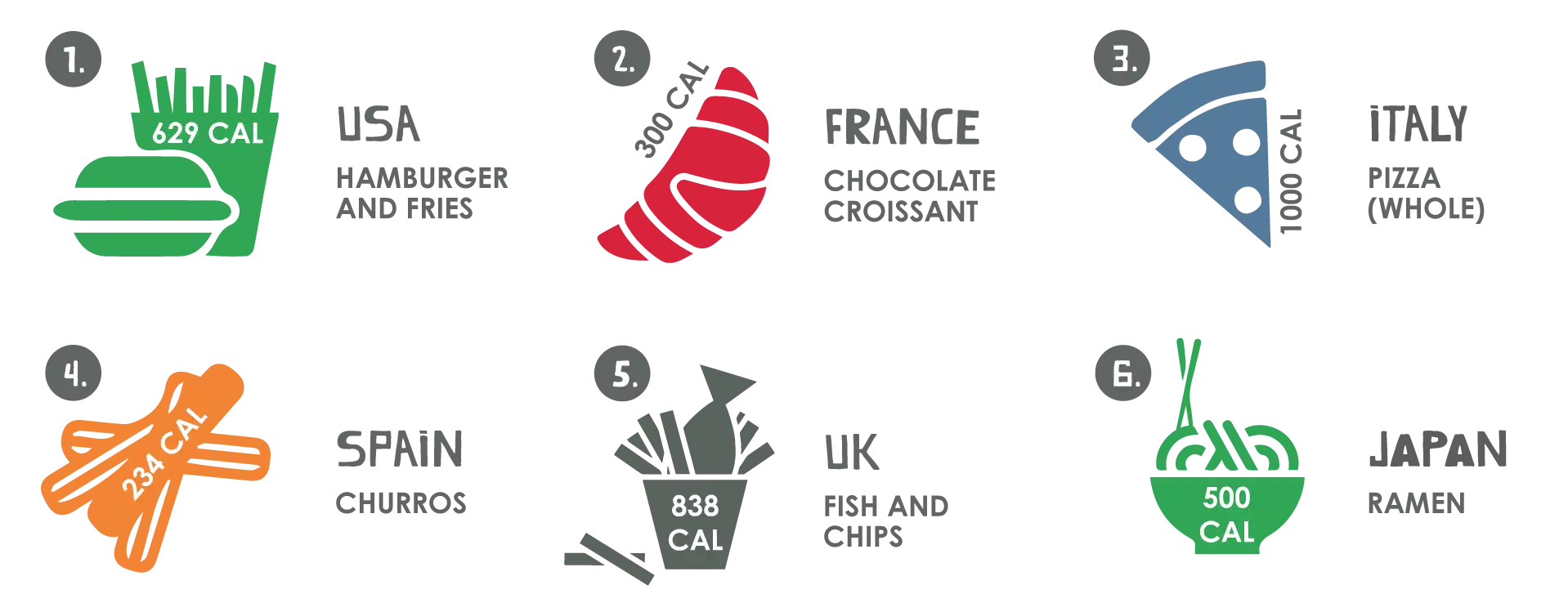
USA: Hamburger and fries: 629 Cal
Can't resist a classic burger and fries? Watch those french fries and say no to free upgrades! Despite being known for hefty portion sizes and fatty takeaways foods, the sheer variety of food in the US means you can always find a healthy option.
France: Chocolate croissant: 300 Cal
Indulgent, buttery pastries, creamy cheeses and rich desserts can do serious damage to your diet. However, despite their fattening national cuisine the French are renowned for their ability to stay slim. Take a French approach and avoid deprivation, simply dine in moderation!
Italy: Whole Pizza: 1000 Cal
It would be a sin not to partake in the true delicacy that is an authentic Italian pizza! Moreover, Italian pizzas tend to be lighter and less greasy than the norm. You can cull substantial calories by selecting sensible toppings like veggies and opting for low fat cheeses like fetta and ricotta.
Spain: Churros: 234 Cal
Churros (traditional, deep-fried treats) aside, the Spanish diet consists largely of olive oil, vegetables and fresh, seasonal products. Along with an abundance of red wine, the diet is said to be one of the world's healthiest. Just follow the Spanish tradition and stick to small portions and eats treats sparingly.
United Kingdom: Fish and chips: 838 Cal
Fish and chips, pies, potatoes and tea may be quintessentially British, but nowadays the UK, and London in particular is home to a huge array of international cuisines. When opting for a serve of fish and chips ask for grilled not fried. This can halve your calorie intake.
Japan: Ramen: 500 Cal
Japanese cuisine is notoriously tasty and low in fat. However, watch out for dishes like crumbed katsu and tempura - these are often deep fried and high in calories. A bowl of traditional ramen can contain well over the recommended daily intake of sodium so enjoy in moderation.
Fitness on the go
Taking a break from the daily grind? You needn't suffer a setback. These quick tips will help you stay toned- even when traversing the globe.
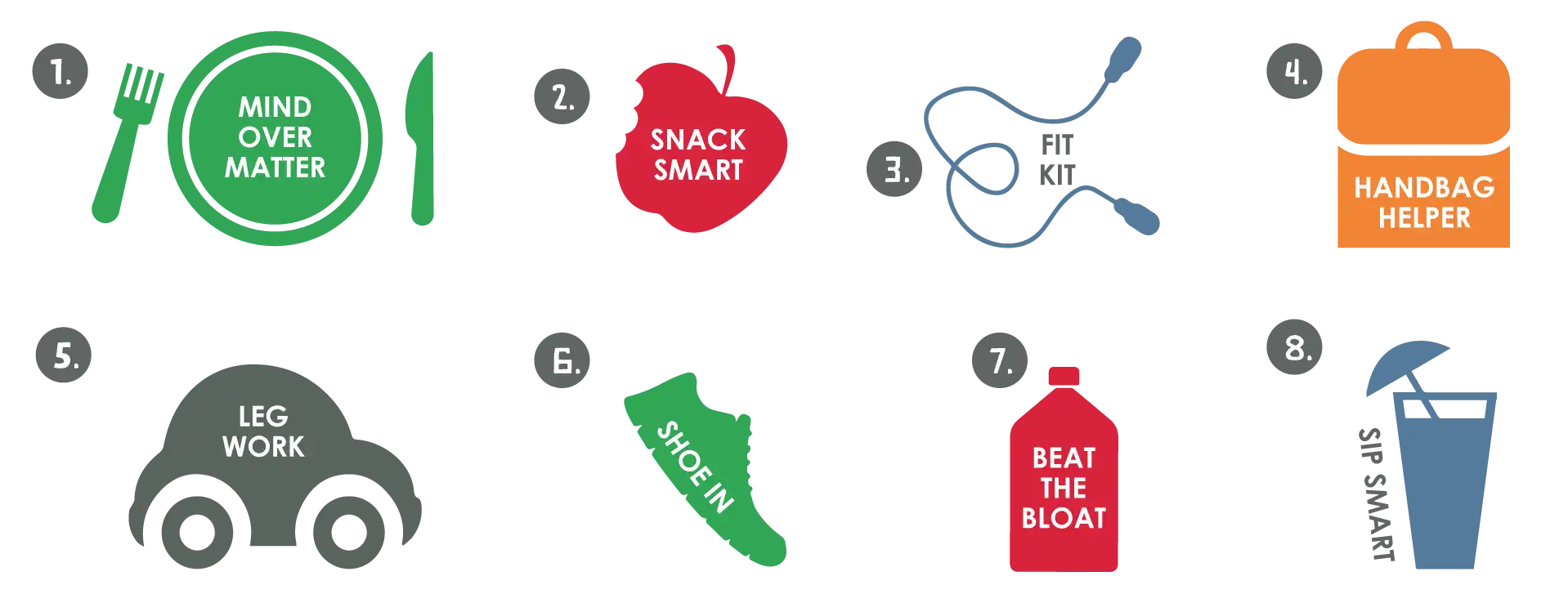
Mind over matter: The occasional indulgence won't bust years of hard work and discipline. However, moderating those extra helpings can assist you to stay in control.
Snack right: Healthy treats can ward of the junk-food travel binge. Fresh fruit, muesli bars and trail mix will regulate your blood sugar and keep the potato chip cravings at bay.
Fit kit: A skipping rope, resistance band and heart rate monitor won't weigh down your suitcase and can help keep your waistline in check through short, daily workouts.
Handbag helper: Picking a sensible travel bag can ease muscle strain and help keep you moving.
Leg work: It's simple but effective, when travelling, opt to walk everywhere you can! Just a few hours of walking per day can have huge health benefits.
Shoe in: Your footwear may be fab but blisters and painful arches won't motivate you to keep active. A pair of lightweight sneakers can take you from the treadmill to tour group in a pinch!
Beat the bloat: Recent studies have linked the dreaded jet lag with weight gain because of disrupted gut bacteria. To beat the bloat take regular probiotics and drink plenty of water.
Sip smart: Wine, beer and cocktails are extremely high in calories. Moderate your intake and select watered down spirits instead.
Holiday helpers
From a bout of the bends to a ghastly spell of gastro, there's no telling where or when you may require medical aid on your travels. What's certain is that it's likely to cost a bundle!
Anyone who's sustained an injury or suffered an illness abroad knows it; getting laid-up on foreign terrain can very quickly upend your dream holiday plans.
And if you're of the frame of mind that 'it won't happen to me,' think again. NZ travellers lodge 200,000 travel insurance claims each year and approximately half of these are for medical expenses.
The importance of travel insurance
Some of our best-loved destinations pose their fair share of costly health hazards. South-East Asia is prone to a high incidence of food-poisoning and road collisions, while medical care in the US is notoriously expensive.
Even destinations with reciprocal health care benefits can catch you out. Costs not covered under the scheme such as repatriation, ambulance call outs, medical prescriptions and optical and dental services can all add up, leaving you substantially out of pocket.
And then there are secondary expenses such as flight changes or additional accommodation and meal costs for a medically-enforced extended stay. Even the cost of flying a loved one out to be with an injured policyholder is one you may not consider.
Never underestimate the true value of travel insurance when it comes to medical cover. Without it, you run the risk of going into thousands of dollars of debt.
Travel health advisories:
Before any form of travelling, it's a good idea to check the CDC (Center for Disease Control and Prevention) health advisories - they'll let you know if there are any health emergencies so you can steer clear if necessary. There are three types of notice to be aware of based on the level of severity, as follows:
-
Warning Level 3, avoid nonessential travel: When checking out the heath notices, a level 3 would indicate you should not travel to a specific region unless absolutely essential.
Example Ebola in Sierra Leone: CDC urges all US residents to avoid nonessential travel to Sierra Leone and Guinea because of unprecedented outbreaks of Ebola in those countries. CDC recommends that travelers to these countries protect themselves by avoiding contact with the blood and body fluids of people who are sick, because of the possibility they may be sick with Ebola.
-
Alert Level 2, practice enhanced precautions: A level 2 alert would indicate it's safe to travel, as long as you follow correct medical advice before leaving the country.
Example Zika virus: Local mosquito transmission of Zika have been identified in international destinations and US territories. Local mosquito transmission means that mosquitoes in the area are infected with Zika virus and are spreading it to people. Certain high-risk populations may wish to delay travel to these destinations.
-
Watch Level 1, practice usual precautions: Level 1 warns that although there is the threat of disease, it's not likely you will come into contact with it. However, it's still advisable to take regular usual precautions.
Example Chikungunya in Mexico: Beginning in October 2014, locally transmitted cases of chikungunya had been reported in Mexico. Local transmission meant that mosquitoes in Mexico had been infected with chikungunya and were spreading it around the general population. CDC recommends that travellers to Mexico protect themselves from chikungunya by preventing mosquito bites.
For more information on world diseases, medical vaccinations or on protecting yourself abroad, you can visit the following links.







